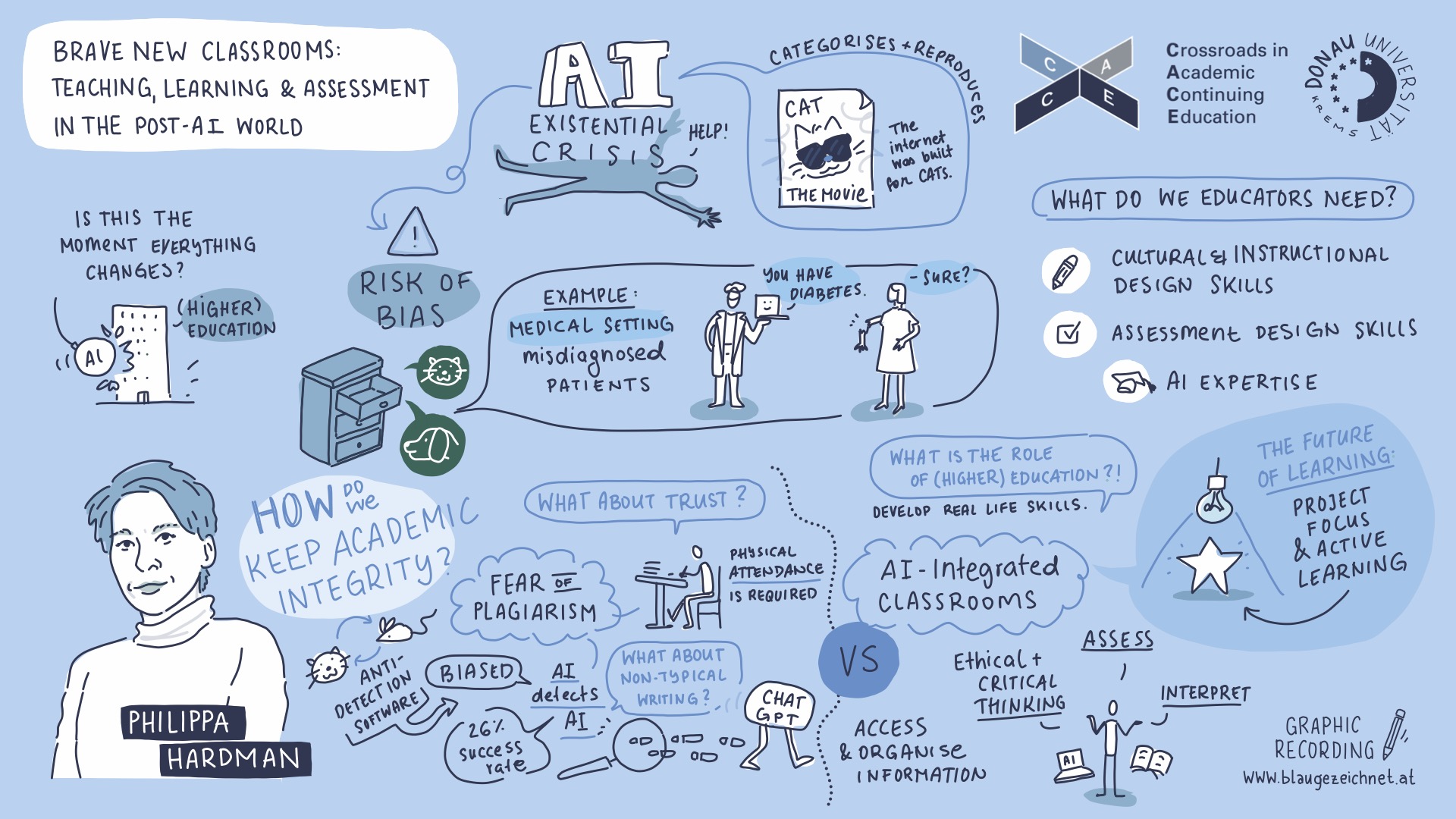
It is omnipresent and it is hard to imagine public discourse without it: artificial intelligence (AI). And it has far-reaching effects on our society – and therefore also on teaching and learning. Philippa Hardman spoke about this at the fourth CACE („Crossroads in Academic Continuing Education“) event. Hardman is a lecturer at the University of Cambridge and a thought leader in learning design.
How people learn and the role that technology plays in this has occupied Hardman for many years. Since the advent of generative AI, she has focused on the question of whether it is fundamentally changing the way we teach.
Currently, the discourse is mainly focused on the risks of AI for academic integrity. This is because the tools are now able to solve problems and write texts – better than the average student. AI uses a lot of data, which it analyzes and from which it then generates new material. By training AI models with given data sets, the tools also reproduce the underlying prejudices or evaluations. This can sometimes have serious consequences, Hardman emphasized, citing medicine as an example: There are cases of incorrect diagnoses and incorrect treatments because data and diagnoses were used that were geared towards white men. Other groups such as women or people of color, on the other hand, were not sufficiently represented, which is why the proposed treatment was not suitable for them.
AI can deliver very good texts in a very short space of time, which presents the academic sphere with an „existential crisis“. There are currently various ways of responding to this. One strategy of educational institutions is to allow students to complete their assignments, essays or presentations in seminar rooms under controlled conditions. To ensure authorship, some institutions are also using special programs to identify whether a text was written by a human or an AI. However, according to a study, these programs only work with a 26 percent recognition rate. It also turned out that these programs do not work without prejudice: Texts written by people whose native language is not English are falsely identified as AI-generated. Finally, there are also AI tools that make AI-generated texts appear more human – an unsatisfactory cat-and-mouse game.
Hardman advocated a different approach – integrating AI into teaching. Instead of simply acquiring knowledge, the focus should be on teaching students critical thinking or problem-solving skills. Students also use generative AI to access information and sort thoughts. The knowledge they acquire in the process, namely the ability to analyze and interpret or digital skills, is essential in the 21st century. What also distinguishes these AI-based learning spaces: The focus there shifts from lectures and exams to project-based learning.
For teachers, this integration of artificial intelligence brings a change, Hardman admitted. It is important that they have the opportunity to acquire sufficient knowledge about AI and its use, also including new teaching methods. For students, the integration of AI in turn means that they must become critical users and shapers of the technology and take on an active role. For all of this to succeed, Hardman concluded that the will to make changes in the sometimes rigid education sector is required.
About Philippa Hardman

Dr Philippa Hardman is an affiliate scholar at the University of Cambridge, a learning scientist and creator of DOMS™️ - a groundbreaking evidence-based learning design process. She is a thought leader in the world of learning design with a large and dedicated following on LinkedIn and Substack. Phil has spent 20+ years researching learning science & designing in the flesh, online & hybrid learning experiences. She has designed some of the world's most high-impact learning experiences, including the University of Oxford's first and most successful MOOC. Phil also successfully led the largest learning design project in history while VP of Learning at ed-tech start-up, Aula. More recently, Phil has started to consider the role of AI in learning design and delivery and recently delivered a TEDX Talk on AI and Education and founded an AI-Ed startup. More to follow on this!